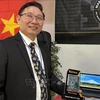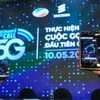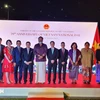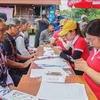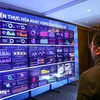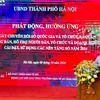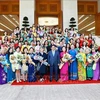Developing 3G services, investing in 4G technology and building a heterogeneous network-HetNet are all designed to optimise the costs and efficiency of the network quality, said Jan Wassenius, General Director of Ericson Vietnam.
Although explosive growth has been seen in 3G subscribers, there is still room for Vietnamese telecommunications companies to promote 3G coverage. A survey conducted by GfK – a market research company – revealed that 3G coverage among mobile users in Hanoi, Da Nang and Ho Chi Minh City was less than 50 percent.
The survey also revealed that 67 percent of the respondents frequently use 3G, mostly to read the news, look for information and log on to social networks. The survey reported that 3G subscribers are expecting improvements in transmission speed, wider coverage and internet price discounts.
By 2020, 3G and 4G technologies will be expanded with 3G upgrades into 3.5G and 3.9G, said a representative from the telecommunications company Qualcomm.
Meanwhile, HetNet, a multi-layered and extremely high capacity network, will be prioritised in cities and densely populated areas with numerous obstacles to strong network connections, such as high-storey buildings and large mobile user traffic.
HetNet offers various technology including 3G, 4G and wifi, as well as a mixture of macro networks and Small Cells- a solution to increase data capacity and provide coverage in buildings and shopping centres.
Experts believed that HetNet would be relevant in every telecommunications market as data service demand is expected to skyrocket. Currently, 50 percent of the networks worldwide are implementing a multi-layered system while Vietnam begins the switch from 2G to 3G.
In a bid to increase network quality, providers need to apply App Coverage indexes evaluating network quality to map out a plan and build a network. In addition, Small Cells instalment should be used increase 3G service quality.
Network quality for video applications is expected to be a future focal point, as they currently make up 45 percent of the total data flow and the figure is expected to reach 60 percent by 2020.-VNA
Although explosive growth has been seen in 3G subscribers, there is still room for Vietnamese telecommunications companies to promote 3G coverage. A survey conducted by GfK – a market research company – revealed that 3G coverage among mobile users in Hanoi, Da Nang and Ho Chi Minh City was less than 50 percent.
The survey also revealed that 67 percent of the respondents frequently use 3G, mostly to read the news, look for information and log on to social networks. The survey reported that 3G subscribers are expecting improvements in transmission speed, wider coverage and internet price discounts.
By 2020, 3G and 4G technologies will be expanded with 3G upgrades into 3.5G and 3.9G, said a representative from the telecommunications company Qualcomm.
Meanwhile, HetNet, a multi-layered and extremely high capacity network, will be prioritised in cities and densely populated areas with numerous obstacles to strong network connections, such as high-storey buildings and large mobile user traffic.
HetNet offers various technology including 3G, 4G and wifi, as well as a mixture of macro networks and Small Cells- a solution to increase data capacity and provide coverage in buildings and shopping centres.
Experts believed that HetNet would be relevant in every telecommunications market as data service demand is expected to skyrocket. Currently, 50 percent of the networks worldwide are implementing a multi-layered system while Vietnam begins the switch from 2G to 3G.
In a bid to increase network quality, providers need to apply App Coverage indexes evaluating network quality to map out a plan and build a network. In addition, Small Cells instalment should be used increase 3G service quality.
Network quality for video applications is expected to be a future focal point, as they currently make up 45 percent of the total data flow and the figure is expected to reach 60 percent by 2020.-VNA


